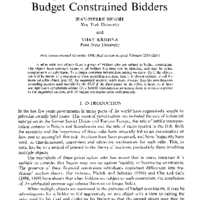
Multiple Object Auctions with Budget Constrained Bidders
A seller with two objects faces a group of bidders who are subject to budget constraints. The objects have common values to all bidders but need not be identical, and may be either complements or substitutes. In a simple complete information setting we show: (1) if the objects are sold by means of a sequence of open ascending auctions, then it is always optimal to sell the more valuable object first; (2) the sequential auction yields more revenue than the simultaneous ascending auction used recently by the FCC if the discrepancy in the values is large, or if there are significant complementarities; (3) a hybrid simultaneous-sequential form is revenue superior to the sequential auction; and (4) budget constraints arise endogenously.
Files
Metadata
| Work Title | Multiple Object Auctions with Budget Constrained Bidders |
|---|---|
| Access | |
| Creators |
|
| License | GNU General Public License (GPLv3) |
| Work Type | Article |
| Publication Date | 2001 |
| Deposited | June 06, 2022 |
Versions
Analytics
Collections
This resource is currently not in any collection.